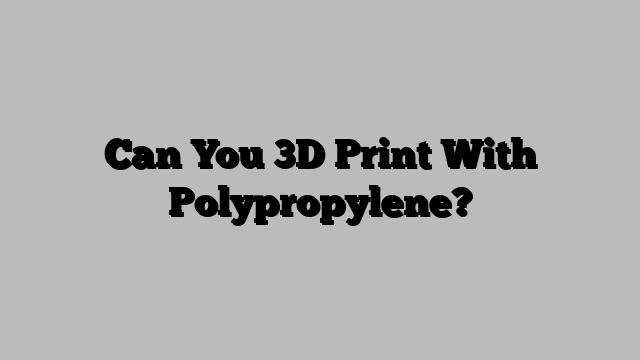Polypropylene (PP) is a popular thermoplastic material used in a wide range of applications, from packaging to automotive parts. But can you 3D print with polypropylene? The answer is yes, but with some limitations. In this article, we’ll explore the possibilities and limitations of 3D printing with polypropylene and provide actionable insights to help you understand the process.
Types of Polypropylene Filament
There are several types of polypropylene filament available for 3D printing, including standard polypropylene, polypropylene blends, and polypropylene-like materials. Standard polypropylene is a durable and lightweight material that is commonly used for 3D printing. Polypropylene blends contain other materials, such as ABS or PETG, to enhance certain properties of the filament. Polypropylene-like materials mimic the properties of polypropylene, but may not be as strong or durable.
Printing with Polypropylene Filament
Printing with polypropylene filament is similar to printing with other materials, but there are some key differences to consider. Polypropylene filament requires a relatively low print temperature compared to other materials, typically between 210-230 degrees Celsius. The print bed should also be heated to around 80-100 degrees Celsius to ensure the material adheres properly. Additionally, polypropylene filament may require a slower print speed and higher layer height to ensure the material is printed correctly.
Post-Processing
Post-processing is an important consideration when 3D printing with polypropylene. Unlike other materials, polypropylene prints may require additional steps to clean up the print and improve its appearance. For example, removing support structures from a polypropylene print may require a different approach than removing supports from a plastic print. Additionally, polypropylene prints may require some sanding or filing to smooth out any rough edges or imperfections.
Applications of 3D Printing with Polypropylene
There are many potential applications for 3D printing with polypropylene, from creating durable parts for machinery to printing lightweight automotive parts. Polypropylene filament is also useful for creating parts with complex geometries or intricate designs that may be difficult or impossible to create with traditional manufacturing methods.
3D printing with polypropylene is possible with the right materials and settings. Standard polypropylene, polypropylene blends, and polypropylene-like materials are popular options for 3D printing with polypropylene. However, 3D printing with polypropylene requires adjusting the printing settings to ensure the material is printed correctly, and may require some additional post-processing steps. With practice and experience, you can master the process of 3D printing with polypropylene and create high-quality, lightweight prints for a variety of applications.
